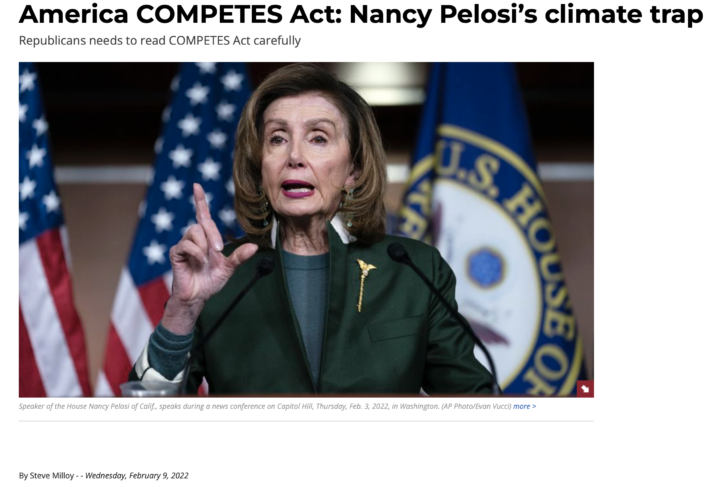My latest in the Washington Times.

The House Republicans have renamed Speaker Nancy Pelosi’s “America COMPETES Act” as the “America CONCEDES Act.” But COMPETES is worse than that. It should be called the “America TRICKED and BETRAYED Act.”
COMPETES, short for “Creating Opportunities for Manufacturing, Pre-Eminence in Technology, and Economic Strength,” is being advertised as making America more competitive with China. But COMPETES does nothing of the sort. Instead, the bill makes us perilously dependent on China. And it does this in a backdoor fashion that was missed even by House Republicans.
COMPETES contains a provision stating, “It is the sense of Congress … that the United States should … implement the Paris Agreement that significantly advances global climate ambition on mitigation, adaptation, and support.”
House Republicans have erroneously concluded that the provision merely urges America to abide by the Paris Agreement. It’s an honest mistake. Unless you have followed the climate war over the past 20 years, you might also miss the potential legal and policy significance of that provision.
Former President Barack Obama signed the Paris Climate Accord as an executive agreement (i.e., just administration policy and not legally binding) in 2015 in order to avoid having to submit it to the Senate, which would have rejected it as a legally binding treaty. Then on the basis of his executive authority, former President Donald Trump pulled America out of the Paris Accord in 2017. Finally, on his first day in office, President Biden recommitted the U.S. to the Paris agreement, once again by executive authority.
Keeping in mind that, per the Constitution, the Senate “makes” treaties by “advice and consent,” you can see where the COMPETES language — “it is the sense of Congress” — could be viewed by left-leaning federal judges and courts as close enough for government work to de facto Senate ratification.
You may think that to be a stretch of the law, but when it comes to climate anything is possible. Two examples come to mind.
In the 2007 Supreme Court decision Massachusetts v. EPA, the Court held 5-4 that the Clean Air Act authorized the Environmental Protection Agency to regulate greenhouse gases. It was a shocking decision because EPA regulation of greenhouse gases is nowhere mentioned in the Clean Air Act. And that was no oversight.
Congress never intended for EPA to regulate greenhouse gases. According to the late Michigan Democrat Rep. John Dingell, a co-author of the Clean Air Act, Congress didn’t explicitly bar EPA from regulating greenhouse gases because, at the time, Dingell and his co-authors didn’t imagine the court would be so “stupid” as to hold otherwise.
Next, under the Constitution, individual states are expressly barred from entering into treaties with foreign countries. But when California’s 2013 climate agreement with the Canadian province of Quebec was tested in federal court in 2020, the court left the agreement in place.
The lesson from these cases, is that when it comes to climate and the federal courts, the outcome may be determined essentially by “jump ball.” And even if the Massachusetts v. EPA decision is overturned this year (the Supreme Court is hearing the case on Feb. 28), much damage to the U.S. economy has been done over the past 15 years.
So it takes a little leap of imagination to see that “sense of Congress” could potentially be held to be de facto “advice and consent” of the Senate. And such “ratification” of the Paris Agreement could provide the Biden with all the authority it imagines it needs to start implementing the Green New Deal agenda without actual Senate ratification or Congress having voted on the details.
Under the Green New Deal agenda, our society would be rapidly decarbonized. The grid would run on wind and solar power, cars would be electric, and plastics and cheeseburgers would be history. Moving past whether this agenda is practically achievable in the first place, the reality is that green technology — like wind turbines, solar panels and electric vehicles — is heavily dependent on Communist China.
As much as 80% the rare earth minerals and metals needed for green technology is either mined or processed in China, according to a recent International Energy Agency report.
Given that COMPETES contains no provisions requiring that green tech components be sourced elsewhere other than Communist China and the Biden administration has offered no serious plan for producing the needed materials in America or at least by reliable allies, COMPETES could essentially doom America to dependence on Communist China, our major geopolitical opponent, to satisfy the Paris Climate Accord obligations and the Green New Deal agenda.
Republicans should run away from COMPETES as fast and as far as possible. If they can’t bring themselves do that, they should jettison any provisions or general approval of anything climate, especially the Paris Climate Accord. They should go one step further and ensure that any mandates for any green technology be premised on the U.S. having an extant supply chain that does not depend on China for necessary materials.
Steve Milloy publishes JunkScience.com and is the author of “Scare Pollution: Why and How to Fix the EPA.”
I was just made aware of this marvelous website by Steve Milloy, just now, as a guest on Laura Ingraham’s The Ingraham Angle program. Thank you Steve. You are a marvelous, refreshing insight of sound science when it comes to the greatest hoax ever effectuated upon humanity: Anthropogenic Global Warming.